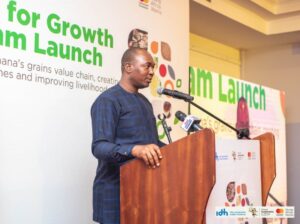The Mastercard Foundation in partnership with IDH – The Sustainable Trade Initiative – has launched an innovative agricultural programme dubbed ‘Grains for Growth’ to transform Ghana’s grain market.
The programme will span the next three-and-a-half years, and aims to develop inclusive and economically viable grain-supply chains which will offer employment and entrepreneurship opportunities, as well as contribute to better incomes and improve livelihoods of farmers – especially among women and youth.
Country Programme Manager at IDH, Robert Asugre, speaking at the launch in Accra highlighted benefits of the Grains for Growth initiative.
“The Grains for Growth programme will partner with a dozen small and medium-sized enterprises (SMEs) in Northern Ghana, including high-profile off-takers and other supply chain actors to create 103,000 work opportunities across the maize, rice, millet, fonio and sorghum supply chains, with the majority of these targetting young Ghanaian women and men.

“The programme will also support the inclusion of 20,000 smallholder farmers through optimised sourcing and service delivery structures, while aiming to significantly increase incomes for participating farmers,” he said.
Ghana Country Head at the Mastercard Foundation, Rosy Fynn, said the initiative will help improve SMEs in the grain value chain while adding to the country’s economic gains.
“The grains value chain holds enormous potential to unlock growth, improve the livelihoods of value chain operators, and catalyse work opportunities for young Ghanaian women and men.
“By building the capacity of value chain actors, providing ready access to markets through off-taker arrangements and access to affordable financial services, we are collectively enabling smallholder farmers and SMEs to scale-up and lead transformation of the sector to become a major contributor in Ghana’s economic growth.
“It will also enable SMEs to improve their operational capacity, meet the quality and procurement standards of multinationals, and also optimise their smallholder farmer sourcing and service delivery structures,” Ms. Fynn noted.
Director for Inclusive Business Development at IDH, Kebba Colley, reiterated that his outfit is pleased to partner in an initiative that will go a long way to improve the grains sector.
“We have witnessed the transformation of local SMEs, and their farmers, into competitive businesses that meet global standards, attract competitive prices for their products and create sustainable jobs, particularly for women and youth. IDH is delighted to extend our work to the grains sector. We look forward to learning and improving the grains sector through this partnership with the Mastercard Foundation,” he said.
Grains grown sustainably
The Grains for Growth programme is part of IDH’s Grown Sustainably in Africa (GSA) programme.
IDH under this initiative works with multinationals – including Nestlé, Unilever, Dutch State Mines/Africa Improved Foods and Dangote – throughout Africa to incorporate smallholder farmers and SMEs into their supply chains through close capacity building, business development support, and facilitating market linkages.
The programme also aligns with the Mastercard Foundation’s Young Africa Works strategy in Ghana, which focuses on deepening efforts in the agriculture and agriculture adjacent sectors to unlock work opportunities for young Ghanaian women and men.
Nestlé Central and West Africa, one of the first off-takers in the programme, will leverage their technical expertise and establish backward integration systems to help build capacity of SMEs in the value chain.
Head of Nestle’s Agricultural Services, Olivier March said: “The programme will not only impact livelihoods and improve local sourcing of grains, but will also leverage on the successful work already done by Nestlé to incorporate regenerative agriculture practices, build our farm ecosystem and reduce our environmental footprint”.
Nestlé is committed to sourcing 20 percent of its produce from regenerative agriculture farms by 2025, 50 percent by 2030 and 100 percent beyond 2050.










